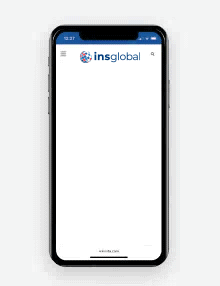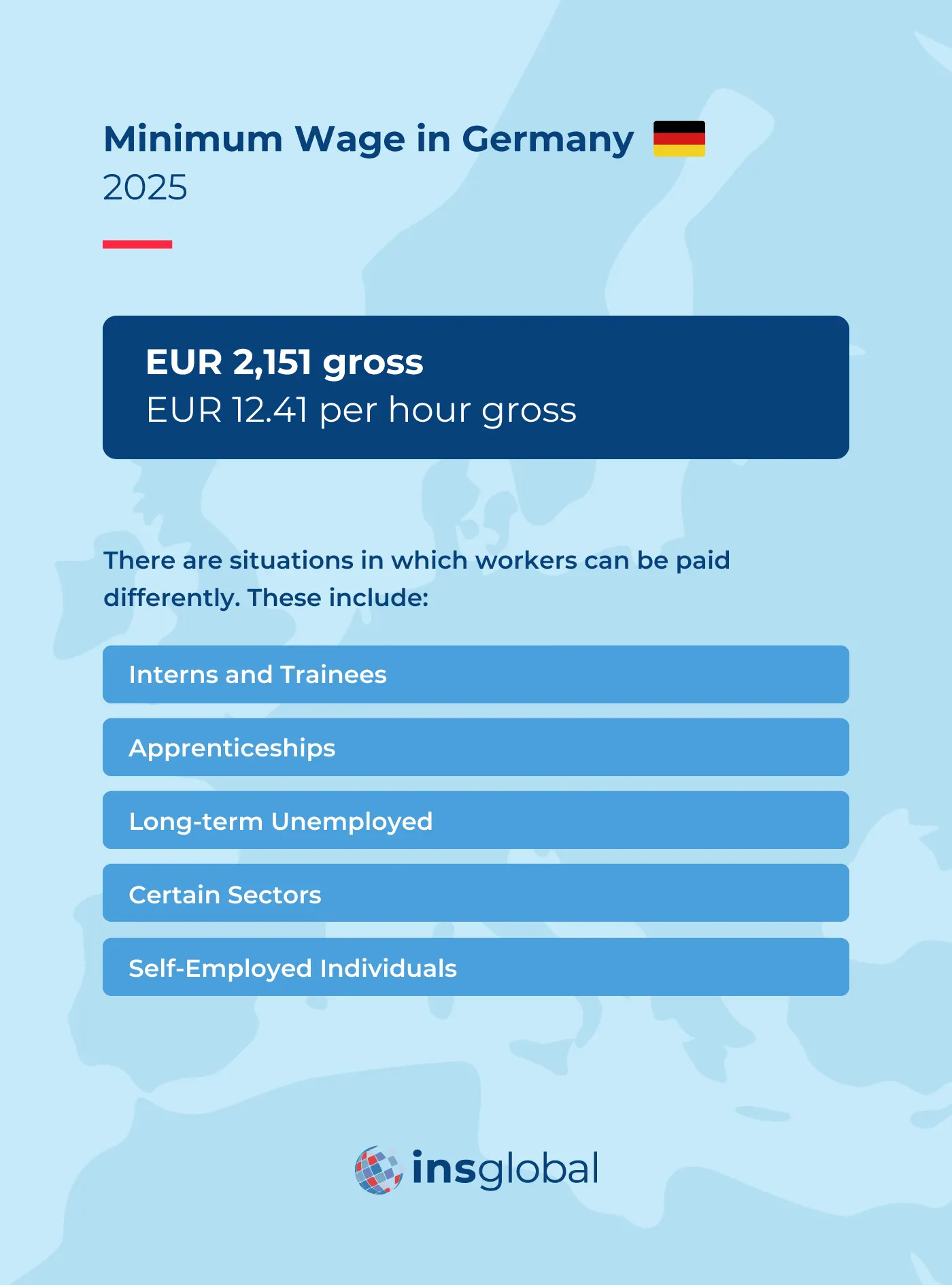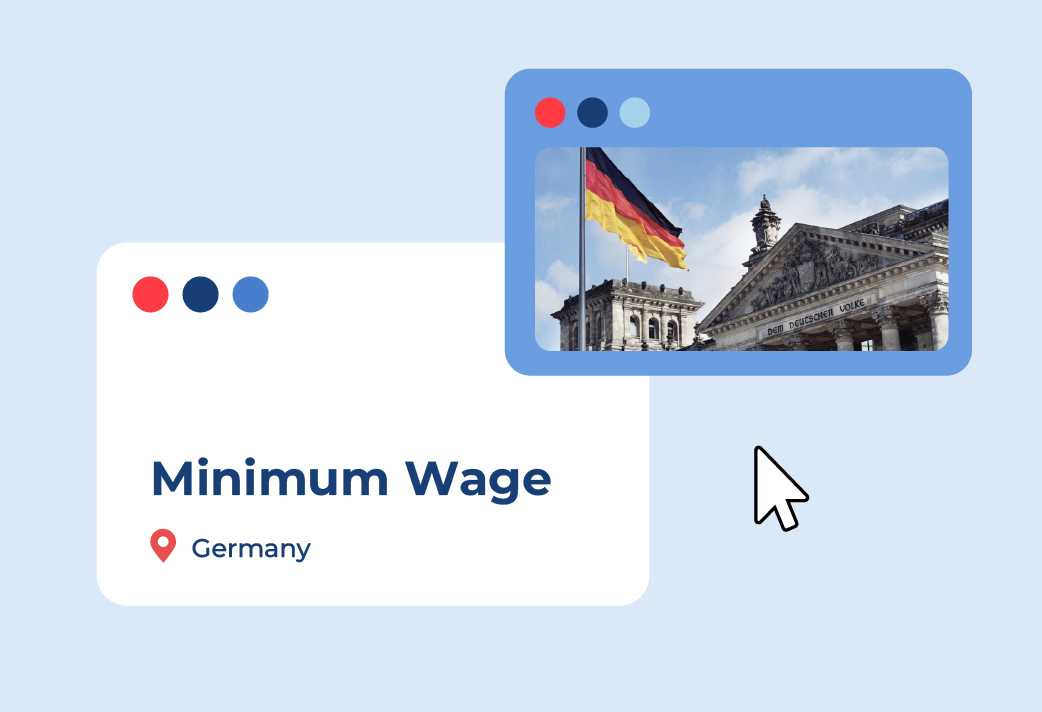When venturing into a new market, a comprehensive understanding of salary standards is crucial for a successful launch and sustained long-term strategies. Understanding the rules around the minimum wage in Germany becomes key when entering this market, just like any other. This seemingly simple factor can influence job performance, long-term employee retention, and overall employee satisfaction.
Germany is serious about compliance errors and has taken steps to improve how it investigates companies suspected of wage theft or employee benefits avoidance. In 2023, it introduced the Whistleblower Act, which now requires all companies above certain thresholds to improve their internal processes around complaints or criminal behavior. Failure to provide employees with their minimum worker benefits, including accurate minimum wage adherence, can lead to severe penalties.

Tired of scrolling? Download a PDF version for easier offline reading and sharing with coworkers
How the Minimum Wage Functions in Germany
In Germany, minimum wage standards have been set at the federal level since 2015. It was initially conceived to unify the wage system, which had previously been set according to the industry.
The current minimum wage in Germany affects all employment in the country with a few basic exceptions. It also applies to both German citizens and foreign workers.
Determining the Minimum Wage in Germany
Based on factors such as the local cost of living, the state of the economy, and other relevant considerations, the minimum wage in Germany is regularly adjusted to ensure a continued of value.
However, there is no set period in which it must be evaluated. The current minimum wage in Germany was last adjusted on January 1, 2024, after being increased in October 2022.
The minimum wage in Germany is also expected to increase again in 2025.

The Minimum Wage in Germany for 2023 and 2024
As of 2024, the minimum wage in Germany is EUR 12.41 per hour gross. This effectively means a monthly minimum of EUR 2,151 gross (based on a 40-hour work week).
Exceptions and Adjustments to the Minimum Wage in Germany
While the minimum wage in Germany applies across the country, there are situations in which workers can be paid differently. These include:
- Interns and Trainees – In certain cases, interns and trainees might be exempt from the minimum wage requirement if their internship is part of an educational program or required for professional training.
- Apprenticeships – Individuals engaged as part of an apprenticeship might have different wage arrangements.
- Long-term Unemployed – Some provisions may exist for long-term unemployed individuals or those who have been out of work for an extended period. These alternative provisions can last as long as the first 6 months of work, where subsidized employment programs or specific initiatives may offer different wage structures.
- Certain Sectors – Collective bargaining agreements in specific industries might require differing (typically higher) minimums than the statutory minimum wage. However, these agreements often set minimum wages that are equal to or higher than the statutory minimum.
- Self-Employed Individuals – Self-employed individuals, independent contractors, and freelancers are generally not covered by minimum wage laws. As service agreements cover their work, they negotiate their compensation by themselves.
In addition, there are typically guaranteed bonuses for trade union members that do not fall under the laws surrounding minimum wage and must, therefore, be considered separately.
The Minimum Wage in Germany During Special Work Hours
Overtime
While not explicitly defined in German labor laws, overtime is typically regarded as work hours outside the standard 8-hour day. When required, overtime is usually compensated at a rate of 1.5X regular pay.
Otherwise, overtime pay rates may be determined by a work council or collective bargaining agreement.
Night Hours
Individuals who work hours during the night (between 11 pm and 6 am) are eligible for unspecified “fair premiums” or additional time off in lieu according to German labor laws.
Rest Days and Public Holidays
While employees working on weekends are entitled to fair compensation (which may be offered at a premium rate at the employer’s discretion), there is no legal obligation to provide a higher pay rate for work on a public holiday. Instead, employers must guarantee a rest day on another day.

Ensure Total Compliance in Germany with INS Global
Recently, stories abound of local and foreign companies facing hefty fines or penalties in Germany for improper workplace practices. Knowing your way around the legal landscape is only part of the solution. That’s why INS Global is ready to provide the consistent necessary support to understand local best practices and benchmarks in Germany.
With expertise in managing HR operations and ensuring compliance with employment laws globally, INS Global facilitates a smooth entry into the German market. Services such as recruiting, payroll, compliance, and HR streamlining are expertly provided by our local Employer of Record (EOR) in Germany, offering tailored solutions to meet specific business needs.
Contact our global expansion advisors today for more information on ensuring a smooth transition into the German market.

SHARE